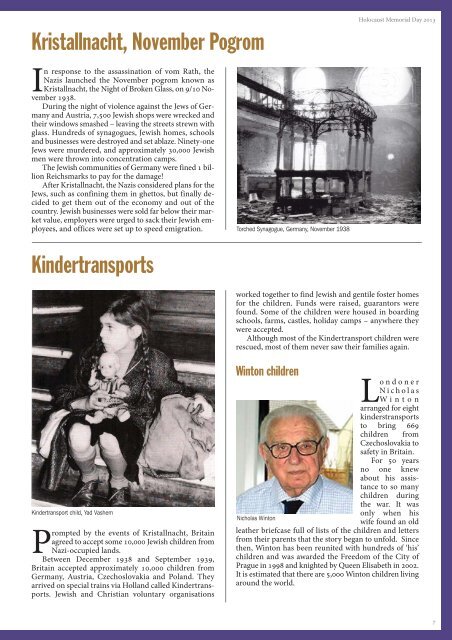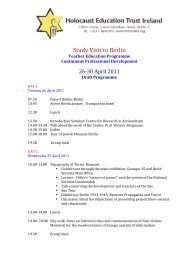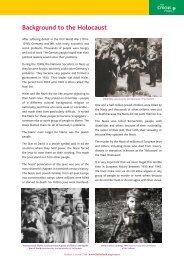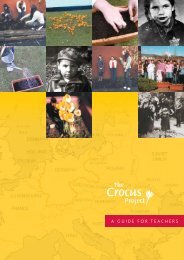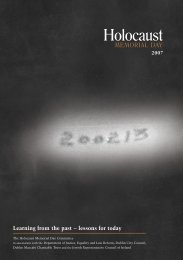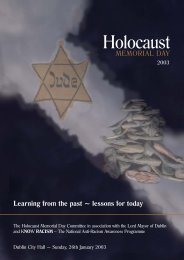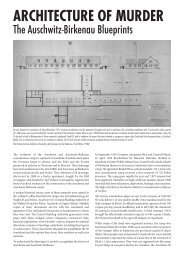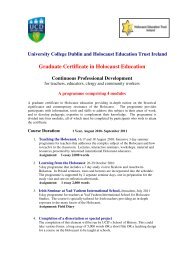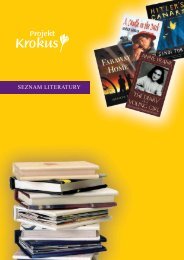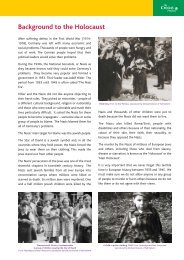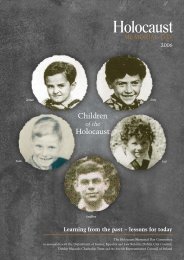19505_HMD_Cover:Layout 1 - Holocaust Education Trust Ireland
19505_HMD_Cover:Layout 1 - Holocaust Education Trust Ireland
19505_HMD_Cover:Layout 1 - Holocaust Education Trust Ireland
Create successful ePaper yourself
Turn your PDF publications into a flip-book with our unique Google optimized e-Paper software.
Kristallnacht, November Pogrom<br />
<strong>Holocaust</strong> Memorial Day 2013<br />
In response to the assassination of vom Rath, the<br />
Nazis launched the November pogrom known as<br />
Kristallnacht, the Night of Broken Glass, on 9/10 November<br />
1938.<br />
During the night of violence against the Jews of Germany<br />
and Austria, 7,500 Jewish shops were wrecked and<br />
their windows smashed – leaving the streets strewn with<br />
glass. Hundreds of synagogues, Jewish homes, schools<br />
and businesses were destroyed and set ablaze. Ninety-one<br />
Jews were murdered, and approximately 30,000 Jewish<br />
men were thrown into concentration camps.<br />
The Jewish communities of Germany were fined 1 billion<br />
Reichsmarks to pay for the damage!<br />
After Kristallnacht, the Nazis considered plans for the<br />
Jews, such as confining them in ghettos, but finally decided<br />
to get them out of the economy and out of the<br />
country. Jewish businesses were sold far below their market<br />
value, employers were urged to sack their Jewish employees,<br />
and offices were set up to speed emigration.<br />
Torched Synagogue, Germany, November 1938<br />
Kindertransports<br />
worked together to find Jewish and gentile foster homes<br />
for the children. Funds were raised, guarantors were<br />
found. Some of the children were housed in boarding<br />
schools, farms, castles, holiday camps – anywhere they<br />
were accepted.<br />
Although most of the Kindertransport children were<br />
rescued, most of them never saw their families again.<br />
Kindertransport child, Yad Vashem<br />
Prompted by the events of Kristallnacht, Britain<br />
agreed to accept some 10,000 Jewish children from<br />
Nazi-occupied lands.<br />
Between December 1938 and September 1939,<br />
Britain accepted approximately 10,000 children from<br />
Germany, Austria, Czechoslovakia and Poland. They<br />
arrived on special trains via Holland called Kindertransports.<br />
Jewish and Christian voluntary organisations<br />
Winton children<br />
Nicholas Winton<br />
Londoner<br />
Nicholas<br />
Winton<br />
arranged for eight<br />
kinderstransports<br />
to bring 669<br />
children from<br />
Czechoslovakia to<br />
safety in Britain.<br />
For 50 years<br />
no one knew<br />
about his assistance<br />
to so many<br />
children during<br />
the war. It was<br />
only when his<br />
wife found an old<br />
leather briefcase full of lists of the children and letters<br />
from their parents that the story began to unfold. Since<br />
then, Winton has been reunited with hundreds of ‘his’<br />
children and was awarded the Freedom of the City of<br />
Prague in 1998 and knighted by Queen Elisabeth in 2002.<br />
It is estimated that there are 5,000 Winton children living<br />
around the world.<br />
7


